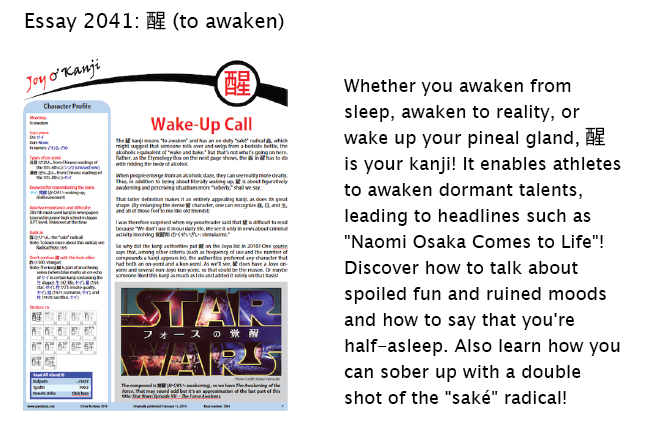Breaking at the Waist
Consider the following expression:
話の腰を折る (はなしのこしをおる: to interrupt someone's conversation)
You likely know 話 as "talk," 腰 as "waist," and 折る as "to break" or "to fold," as in 折り紙 (おりがみ: origami). How could these three kanji add up to mean "to interrupt one’s conversation"? It's possible because two of the three characters convey something unexpected here. Which two are acting funny:
a. 話
b. 腰
c. 折
I'll block the answers with a preview of the newest essay:
b and c. Although 腰 does mean "waist" in 話の腰を折る (はなしのこしをおる: to interrupt someone’s conversation), the waist is at the center of the body, so this 腰 figuratively conveys "center" or "middle" of a story.
Meanwhile, 折る can mean "to interrupt," as it does in this case.
But here's an unexpected twist. When these two kanji join forces in 腰を折る, they can either carry the figurative meanings we've seen or they can convey literal definitions. Check it out:
腰を折る (こしをおる: (1) to interrupt (a story, etc.); (2) bend at the waist)
So 話の腰を折る could simply be a story about bending at the waist!
Although 折る seldom means "to interrupt," I did find this example:
筆を折る (ふでをおる: to stop writing)
As 筆 primarily means "writing brush; paintbrush; pen," one might logically take 筆を折る to mean "to break a brush in half"! Theoretically that's possible. But 筆 often represents "the act of writing," and that's the case in 筆を折る. The phrase usually means "to give up writing (novels, essays, etc.)" in terms of one's career.
How confusing and rich Japanese is, all at once!
The phrase 話の腰を折る appears in essay 2041 in a sentence featuring the keyword 興醒める (きょうざめる: to lose interest):
話の腰を折られて、興醒めた。
We lost interest in our conversation because he interrupted it.
Actually, 腰 makes two appearances in the essay, also popping up in the center (!) of this term:
大腰筋
What do you think it could mean? After all, 大 could literally represent "big" or figuratively convey "intense," as in 大嫌い (だいきらい: to detest). Moreover, 筋 primarily represents "muscle" but also pops up in terms such as 筋道 (すじみち: reason; thread (of an argument)) and 大筋 (おおすじ: outline). Oh, there's 大 again! Is 大腰筋 about the center of an outline, the part of a story that can grow "flabby" (as I recently heard a novelist say)?!
No, 大腰筋 (だいようきん) is the name of a muscle, the psoas, the one that hurts like hell whenever I do yoga! I found that muscle name in this book title, which I included in essay 2041 because the title begins with 目醒める (めざめる: to wake up):
「目醒める! 大腰筋 コアを鍛えて内面から身心を改善」
Wake Up Your Psoas! Improve Your Mind and Body
from the Inside by Training Your Core
鍛える (きたえる: to train); 内面 (ないめん: inside);
身心 (しんしん: mind and body); 改善 (かいぜん: improvement)
Training the core is important. Training oneself to recognize literal versus figurative uses of kanji is also important! And sometimes each pursuit seems infinitely challenging!
Catch you back here next time!
❖❖❖
Did you like this post? Express your love by supporting Joy o' Kanji on Patreon:



Comments